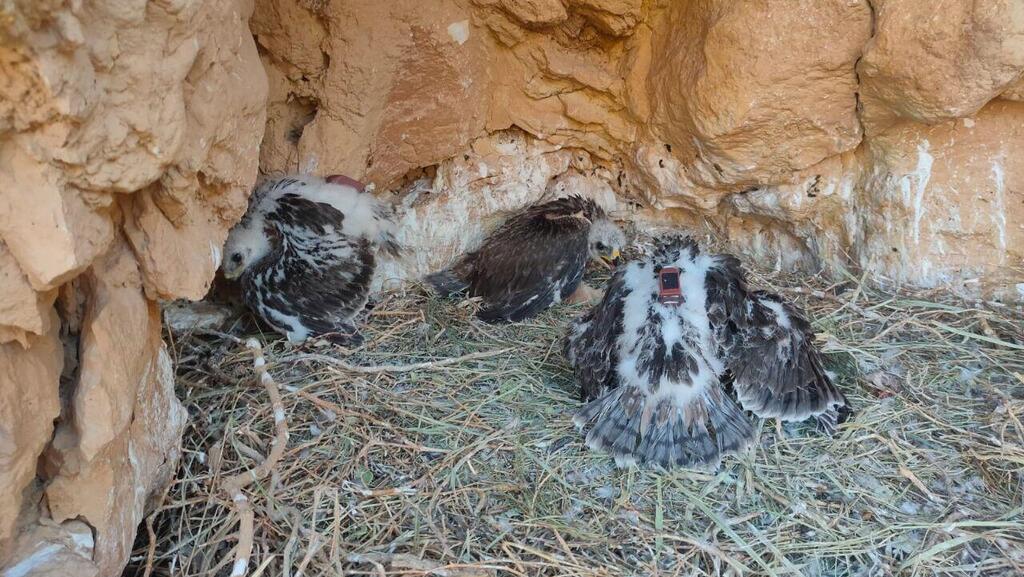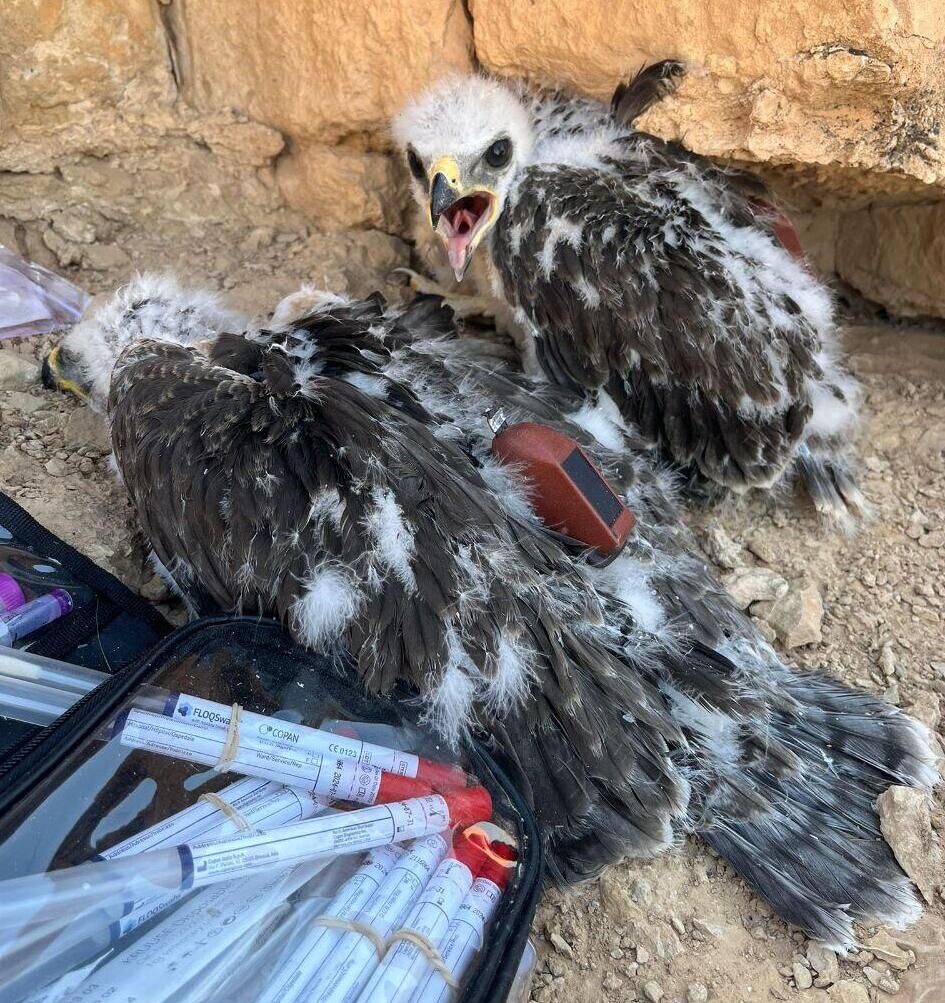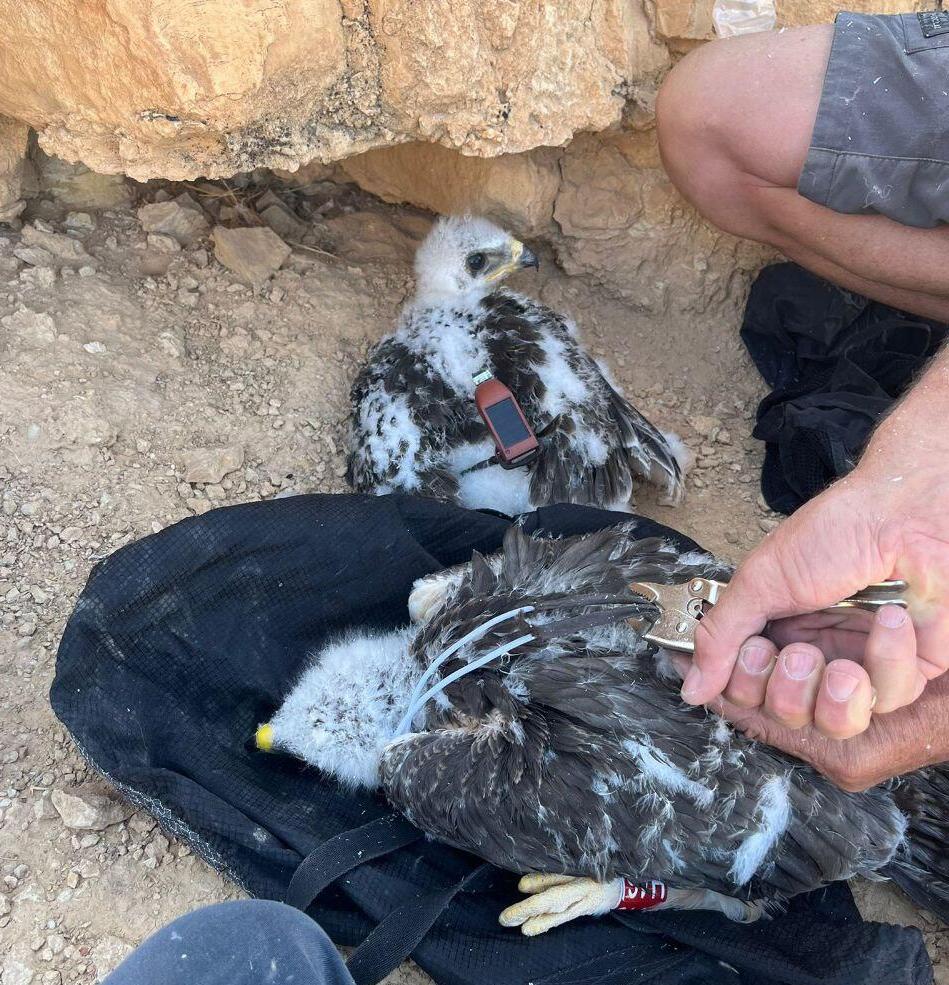Nature and Parks Authority ecologists made a rare find when monitoring the nests of Bonelli's eagle (aquila fasciata), more commonly referred to as hawk-eagles, in the Judean Desert - a nest containing three about six-week-old chicks. There are only 25 pairs of hawk eagles in Israel, not all of them nest, and are in serious danger of extinction.
"It's a pretty rare event," said avian ecologist Ohad Hatzofe of the Nature and Parks Authority (NPA). "Usually there are one or two chicks in the nest. But three? Doesn't happen every day. This is a wonderful addition to the local population of the species, which is in serious danger of extinction."
3 View gallery


Three hawk eagle chicks found in one nest
(Photo: Techia Rakovsky, Nature and Parks Authority)
One of the reasons why it is rare to find three chicks in one nest is due to the phenomenon called Cainism (from the biblical Cain). Sometimes, when there are two chicks in the nest, or three as in this case, the adult chick will harass and harm the younger and weaker chick in the fight for resources.
"Apparently this is a pair of successful and good parents, who managed to bring enough food for three chicks, and therefore they all succeeded in making it through the Caninism stage that usually occurs atthe age of two to three weeks," Hatzofe explained. "This is the first nest in at least five years where three chicks were found at this stage of nesting."
The hawk eagle reaches maturity at a relatively young age and hunts pigeons and medium to small birds. It also hunts hyraxes and small mammals. The length of an adult hawk-eagle reaches 20-25 inches and has a wingspan of about 5 feet. The eagles raise their chicks together and work shifts – one incubates/guards the chick and the other hunts. For the most part, an eagle is a monogamous raptor.
Hatzofe added that "during the nesting period, we try to monitor the nests and visit most of the eagles' nests, we check the chicks for pathogens and diseases, we broadcast videos of the chicks and set up guarding of the nests. This monitoring activity for the two populations - the golden eagle and the hawk eagle, yields results and a noticeable increase in the number of nesting pairs and a return to nesting in areas abandoned several decades ago."
3 View gallery


Avian ecologists care for the three hawk eagle chicks in their nest
(Photo: Techia Rakovsky, Nature and Parks Authority)
3 View gallery


Avian ecologists take care of the hawk eagles
(Photo: Techia Rakovsky, Nature and Parks Authority)
The Nature and Parks Authority is currently working together with researchers from the Veterinary Institute and the Israeli Wildlife Hospital to increase the survival of the chicks. Of the three chicks found in the nest, they cared for two that suffered from a parasite, which they contracted from eating pigeons.
Meanwhile, samples were taken from the chicks and transferred to the Veterinary Institute in Beit Dagan to continue the monitoring and research work.
"We hope that in about two or three weeks the chicks will move out of the nest and strengthen the local population," concluded Hatzofe.
As part of the ongoing work of the Porsim Kanaf project, the NPA and its partners in the Fund for the Protection of Nature make great efforts to preserve the population of birds of prey, which are in danger of extinction. As part of the project, a guard is stationed to prevent hatchlings from settling in strange nests.
Individuals born from the breeding nucleus at the Carmel Wildlife Center are acclimatized to the wild to help restore the local population, and there is an effort to monitor the eagles that flourish from nests in the wild, in parallel with the efforts of the Electric Company to shield high voltage poles to prevent electrocution of the birds.


